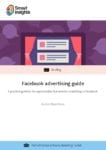It’s well reported that 2017 was Facebook’s hardest year to date so far
Concerns about inappropriate content, fake news, and privacy scandals with third parties have marred the Facebook name. So much so in fact, that it has lost almost $100 billion in market value recently.
So is that a signal that our advertising love affair with Facebook could be over?
As one of the biggest worldwide advertising platforms, it’s unlikely, but advertisers are calling for greater transparency.
Privacy update
In response, Facebook has announced that it is updating its terms on privacy and data sharing. This move will give users a clearer picture of how the social network will handle personal information, in the hope that it doesn’t encounter more Cambride Analytica cases.
The updated terms of service aims to focus on how Facebook gathers and uses data, and why users see the ads that they do.
According to chief privacy officer Erin Egan and deputy general counsel Ashlie Beringer. Facebook is "not asking for new rights to collect, use or share your data on Facebook”. It “also not changing any of the privacy choices you've made in the past."
Claiming it won’t sell or disclose any user data, the update states that Facebook will offer better information on how the advertising platform operates too.
Facebook’s COO, Sheryl Sandberg has said that a few advertisers have paused campaigns. Ms. Sandberg stated, “they want to make sure they can use data and use it safely.”
Facebook Advertising Guide
There have been a number of recent changes to how ads are set up and reported on within Facebook. This guide will update you with all the latest changes and give you practical advice on setting up and optimising your Facebook ads to get the best possible results.
Access the Facebook advertising guide
The removal of third-party data
The first major change as a result of the action is that Facebook has shut down its Partner Categories program. This was the method that allowed advertisers to target customers based on behaviours that happened outside Facebook.
Typically, these are adverts with the aim of prospecting, using this data to find new customers.
So what does that mean for advertisers?
For those who have relied on using third-party data for targeting (and prospecting), it will therefore see the option removed.
So depending on their strategy to date, some industries will be more affected than others.
Take entertainment for example. Companies like Netflix who primarily use third-party data to market new offerings, will be hit quite badly. Or organisations like Procter & Gamble who have moved away from more expensive highly targeted ads and more towards mass reach.
For others that have focused on their internal data and resources for targeting however, should be less affected.
We expect more clarity from Facebook in the coming months to explain this further, and to clarify where ‘first-party data’ ends and third-party begins.
We’ve just updated our Facebook Advertising guide to help you keep up with the latest changes to the platform.







